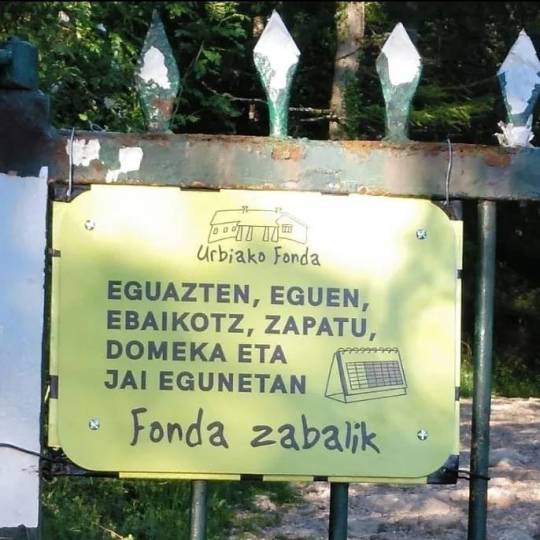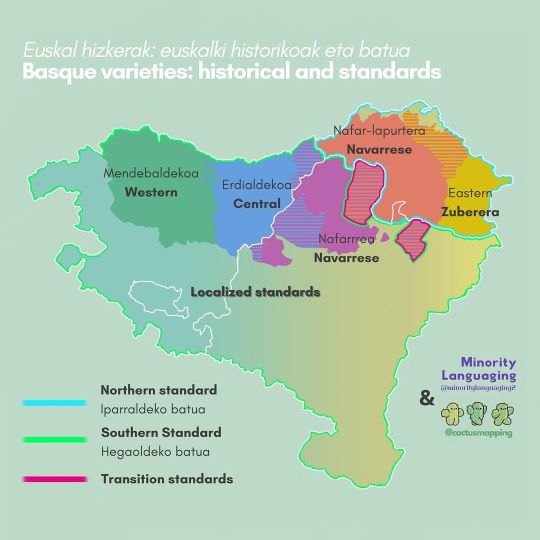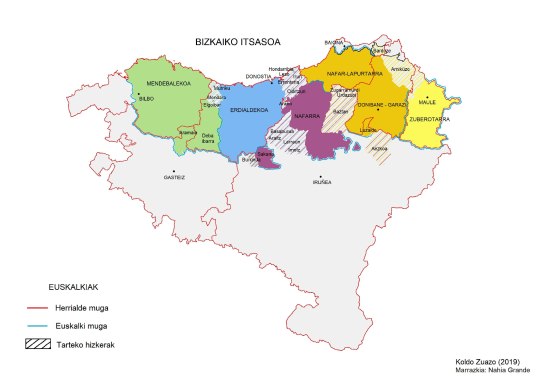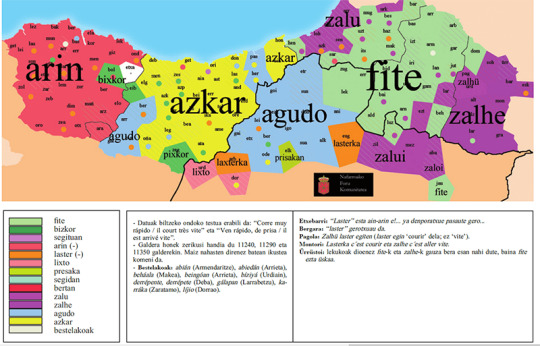#euskalkiak
Text


The same sign in Western dialect (top pic) and standard Basque (bottom). It reads: Restaurant open on Wed, Thu, Fri, Sat, Sun and holidays.
That's why I will always recommend Basque students learning standard Basque first and then their target dialect if there's any. Dialects can be wildly different, but at least standard Basque may work as a lingua franca.
[x]
#euskal herria#basque country#pays basque#pais vasco#euskadi#euskara#euskera#basque#language#euskalkiak#dialects#sign
32 notes
·
View notes
Text
Crec que si seguiu amb el No Spanish September a finals de mes ja sabré parlar aragonès i basc
#mètode molt més eficaç que qualsevol pla d'estudis que em pogués inventar#baina euskara batua euskalkiak baino hobeto ulertzen dut eta ez dut atsegin :////#euskalkiak ulertzen nahi dituuuuuuuuut :')))))))#beno lehenbizi euskara batua ulertu beharko nuke eta gero euskalkiak ikasi ahalko ditut#(hau ez da zuzena baina praktika egin behar dut)#no faig el repte perquè soc covard però potser intentaré posar més etiquetes en català en comptes de l'anglès#a veure si bloguejant a tumblr em surt el c2 :')#perce rambles#(zuzendu ahal nauzue betiko zuzendu ahal nauzue lagunak)#(ikasi nahi dut)
2 notes
·
View notes
Text

[x]
#euskal herria#basque country#pays basque#pais vasco#euskadi#maps#euskera#euskara#basque#language#euskalkiak#dialects#culture
21 notes
·
View notes
Text

All dialectal Basque words to say ladybug.
Some translations:
maritxuteilateko - lil mari of the roofs
marigorringo - mari in red
marigorri - red mari
amonamantalgorri - grandma red apron
amandregonagorri / andekotagorri - grandma red skirt
amonagorri - red grandma
mainaminagorri - red need of caress (tricky one, this translation is the one that makes more sense)
aitasemegorri - red father and son
#euskadi#euskal herria#basque country#pais vasco#pays basque#euskera#euskara#basque#language#maps#words#vocabulary#euskalkiak#dialects#culture#travel
52 notes
·
View notes
Note
Are there different dialects in Euskadi/Nafarroa comparing with Iparralde? Despite being under control of different countries, are the cultural links similar?
Kaixo anon!
These are the Basque dialects:

Not only there are dialectal differences between northern and southern EH, there's almost a dialect per region. While the central ones - center (blue), Nafarra (purple) & Nafar-Lapurtarra (orange) - are pretty much similar and intelligible, the ones on the sides [Western (green) and Zuberotarra (yellow)] are very very very different and the further away from them you live, the harder they are for you. A Western dialect speaker could hardly follow a Zuberotarra without knowing standard Basque, and still.
And these are the percentages of people that speak or understand Basque:

As you can see, Lapurdi and Nafarroa are the areas where people speak Basque the least, Bizkaia and Gipuzkoa being the ones the most. Behe-Nafarroa & Zuberoa resist in orange in France thanks to the isolation of the Pyrenees, not gonna lie.
It's ironic that Lapurdi - the green region - which has a huuuuge tourist industry in Biarritz, Basque Coast, etc, etc, and is sold like the quintaessencial Basque spot is the second area with least Basque speakers: many ikurriñas, many lauburus, many txapelas as a souvenir, and where is Basque language though?
A few years ago we heard a Basque person say I don't care about Iparralde, I have more things in common with someone from Burgos [a Spanish region] than with someone from Baiona and we felt so sad because it's somehow true; we're losing our cultural union, that's always been our language. Euskal Herria means the people of Basque language and after centuries of assimilation and laws against Euskara here we are.
#euskadi#euskal herria#basque country#pais vasco#pays basque#euskera#euskara#basque#language#maps#euskalkiak#basque dialects#anons
39 notes
·
View notes
Photo

This text is written in Behe-Nafarrera, a dialect with almost extint variations on the Southern Pyrenees [colours salmon and pale salmon on the map]. Erronkariera - spoken in the most Eastern territories, vanilla-colored on the map - was lost but there are efforts to recover it.

The association mentioned below works so the Behe-Nafarrera sub-dialects don’t die out too. We admit we had to look some words up!
With Erroibar, Auritz, Artzibar
Garazi and Luzaide
With Aezkoa, Zaraitzu, Zuberoa
and Erronkari
Let’s promote Euskara
all of us that are part of the Pyrenees
West and East
speaking our language.
The North and South
border has created much pain
Gathering through the Pyrenees
we’ve weaved a net.
With the works of Kebenko [association for the promotion of Euskara]
or the words of our palates.
Be all of you welcome
to the Forum of Basque dialects.
#euskadi#euskal herria#basque country#pais vasco#pays basque#nafarroa#behe-nafarrera#erronkariera#euskalkiak#euskara#basque#languages#maps#poem
32 notes
·
View notes
Note
What’s your opinion on the effect that Batua is having on the Euskalkis, and how is this issue of dialects navigated? In a place where the parents and grandparents traditionally speak some Euskalki, and the kids go to school in Batua, do they lose some of the traditional Euskalki? In Iparralde their dialects seem to differ quite a bit from Batua. What are people’s opinions on this? Is there any teaching done in Euskalkis?
I know that standardized language is essential for the survival, but this looks like it’s prone for some tea 🍵
Kaixo!
Outside the capitals, the Basque taught in the schools is usually the dialect - euskalki, for those wondering ^_^ - present in town. Yes, they follow the unified grammar and the exams should be in batua, but the differences are quite little and easy to learn, unless we're talking about Western or Zuberera dialects.
As we have explained before, batua is heavily based off Gipuzkoan-Lapurdian dialects since they were the chosen ones by most notable Basque writers and considered as classier. This means that the further away from this regions you live, the less your dialect will ressemble batua, being the furthest ones Western and Zuberera.
Western is one of the dialects with more speakers, though, and since it differs so much it's now standardized and children are taught this dialect; you can even decide to take your EGA - Basque proficiency - exam in Western dialect or batua.
Zuberera, on the contrary, is losing speakers thanks to France and its politics regarding regional languages ¬_¬.
For euskaldunberris - new Basque speakers - batua is essential, and dominating it is very easy to adapt and speak in a dialect you live surrounded by. At the end of the day, Euskara is diverse and ecclectic, and what if you speak an interesting mix made of 80% batua + 10% of Arratiarra + 10% Tolosarra? Absolutely nothing. Languages are used to communicate, not to be purists.
The thing is that batua is very much needed not only to have new speakers, but as a bridge between dialects. It's like a lingua franca that may be too technical or unnatural for some, but it lets you keep speaking in Basque with the other person without turning to Spanish or French if the dialect is not the same and they differ too much to understand each other.
Besides, a huge effort is being made by different institutions to preserve the richness of our dialects and that no more euskalkiak disappear - like it happened with several in the past, sadly -, recording how older people speak and the different terms each dialect has.
#euskadi#euskal herria#basque country#pais vasco#pays basque#euskara#euskera#basque#language#euskalkiak#dialects#personal
29 notes
·
View notes
Photo

Since today is the International Day of the Basque language, an awesome discovery was revealed: the most ancient poem written in Euskara has been found on the margins of some notarial documents. You can see in the image above how difficult it is to read, since the verses mix with the other lines and the font is devilish.
It dates back to the 16th century - scholars consider it was written sometime between 1508-1521 - and it is presumed to be a draft, not by a professional poet, but by some teenager in love who was an scribe apprentice.
The poem lacks any literary quality, but it’s very valuable since it’s written in old Eastern dialect and it’s the only document we have that uses this archaic form, so it’ll be very useful for linguists.
This is the poem - remember, the oldest one in our language to date.
Ene laztan gozo ederra
My sweet beautiful love
penaz penaçen naçu
you have me agonising in pain
Orreyn culez ninduçula
Having me that “zulez” [word unknown]
Nola amora nençaçun
How did you make me fall in love
ori escuan ezpata?
with that sword on your hand?
Çeure escuoz naraçu
You bring me in your hands
andicoz eta ebeticoz
from here to there
Barcaçio diqueçut ezcutaria,
I’ll give you my pardon, squire
usatu eztet arma guiza erayten
I’m not used to killing people
lecobidi guiçon gaztea
but the young man.
Amore minez penaçen
Agonising due to love pain
olloa lumaz estari
the chicken covered in feathers
ni amorez yçerdi
myself sweating of love
ene barco negarretan
in my tears
çaldiac [ag]ueri leyara
horses come to the battle.
Niri [j]uan çatan neure amorea
Love went away from me
leena [on]ezquero
the first one
oy [d]aducat neure vioçean barruna.
I already have it inside my heart.
#euskadi#euskal herria#basque country#pais vasco#pays basque#euskera#euskara#basque#language#poem#poetry#love poem#history#linguistics#international day of the basque language#euskalkiak#eastern dialect
191 notes
·
View notes
Note
Kaixo! I saw a discussion recently about batua being "nobody's native language" and only being used in media/education. I thought it was really interesting, do you have any information on this? Eskerrik asko!

Kaixo, anon
Basque dialects are quite different from one another, which has always been an obstacle for writers, bertsolariak (improvising poets), priests, and basically anyone that wanted to reach the widest Basque audience. We know that back in the 18th century, some writers established some rules they would follow, but they were too general and still many info was lost due to unintelligebility.
Every living language needs a standard. A standard is needed to teach and study a language, to write and to speak, and to be understood - to a great extent if not 100% - in any place that language is spoken. Spanish standard was set in the 15th century based on the Castillian dialect that left other dialects like Mozarab completely out and ready for extintion; German and Italian had unifying and standard-setting processes in the 19th century; Basque had its own in the 70s, after Franco died. There was a first attempt in the 20s, but the civil war and the dictatorship that followed made it impossible.
Just like standard Italian was mostly based on the Tuscan dialect (correct us if we’re wrong about this) - mainly because many great Italian writers had chosen it for their works - standard Basque was mostly based on Gipuzkoan and Lapurdian dialects, which, exactly like in the Italian case, had been the preferred dialects of Basque writers and had an overall perception of being more classy. Even nowadays, even if you master unified Basque, there are dialects that are very challenging because of this, because they differ too much from Gipuzkoan-Lapurdian.
Contrary to the desire that Euskara remained being a group of unintelligible dying dialects that many people still have, standard or unified Basque (Euskara batua in Basque) has helped Euskara survive and leave the dying state centuries of bans had left it in. It has made Euskara gain speakers and enthusiasts both in our country and all over the world, and given Euskal Herria more cultural cohesion. We can guarantee you that unified Euskara is the mother tongue of THOUSANDS of people nowadays, and that its setting and teaching lets us study at uni in Basque, for example, and has lead to a cultural renaissance that can reach all our country and not just our little valley where our own dialect is spoken, like it would happen in the past.
You can’t even imagine HOW fed up we are with this constant misinformation and hatred towards unified Basque; with people that always use the same old and completely wrong arguments - it’s a made up language, it’s artificial, it’s nobody’s mother tongue, it’s not real Basque, etc - with the sole intention of discrediting and invalidating our language. That you even pay them any attention is sincerely disheartening, anon.
#euskadi#euskal herria#basque country#pays basque#pais vasco#euskera#euskara#basque#euskalkiak#languages#fed up#personal#anons#animated gif#Anonymous#linguistics#german#italian#spanish
56 notes
·
View notes
Note
What dialect does Pello Reparaz from Zetak speak? I love his cute pronounciation of the sound “tu” or whatever. Could you tell me more about it if you know what I’m talking about? Really nice sound, that “t”.
Kaixo!
He's from Arbizu, which is territory of the so-called iparraldeko goi-nafarrera or northern high navarrese dialect. However, this sub-dialect is quite difficult to differentiate from the central / Gipuzkoan one. He sings mostly in batua with a Gipuzkoan accent if you ask us.
The pronounciation you refer to doesn't happen when a U follows a T, but when a T follows an I. Linguists call it palatalization: T becomes a softer version of itself.
ex: zaitut sounds sy-djoot
maite sounds my-dje
In other words and dialects this same sound is written "tt" or "dd", like in name Bittor [Bidjor] or word onddo [ondjo].
#euskadi#euskal herria#basque country#pais vasco#pays basque#euskera#euskara#basque#pello reparaz#euskalkiak#dialects#pronunciation#linguistics#langblr
5 notes
·
View notes
Text
Ice
Different ways of saying ice in Euskara:
- izotz
- jela
- horma
- karroin
- lei
So don’t believe that rumour that floats online about how basic the Basque vocabulary is: there are 5 main dialects very different from one another, each one with its own words which are all valid and accepted by the Academy of Basque language.
Euskara may have few speakers but it’s a very rich language, don’t let anybody fool you ^_~.
#euskadi#euskal herria#basque country#pais vasco#pays basque#euskara#euskera#basque#language#words#euskalkiak#dialects#vocabulary#culture#linguistics
24 notes
·
View notes
Note
kaixo! aurrekoan Arabako euskarari buruz galdetu zuenari (mapei buruz): Euskaltzaindiak mapa hauek egiterakoan orain arte mantendu diren-edo euskalkiei bakarrik erreparatu die, eta Araban (Nafarroako toki batzuetan bezalaxe) bertakoa zen euskalkia galdu egin da. alde batetik ados nago mingarria dela batuaren mespretxu hori, baina beste alde batetik, nik ulertzen dudan moduan batua euskalki guztiek osatzen dute. adibidez, bai "gabe" bai "barik" dira batua, nahiz eta jendeak pentsa dezakeen ezetz. orduan, mapa horiek egiterakoan erabili dute batua ez dena, horiek osatzen baitute batua eta batuaren barruan barietate asko daudelako ez direnak "historikoak", nolabait esateko. dena den, ziurrenik adineko jendea erabiliko zuten eta jada herri horietako jendeak hitz batzuk ezberdin esaten ditu. orduan... iruditzen zait bai batua bai gazteagoen hizkera mespretxatzen dela askotan ez delako hain "purua", eta agian ondo legoke Araba etab. ere kontuan hartzea, gazteak ari garelako euskara egiten - dela batua, dela euskalkia. ez dakit oso ondo azaldu dudan esan nahi nuena 😅
Kaixo, anon!
Bai, argi ta garbi utzi duzu!
Ados gaude ia denarekin. Gure ustez, batua mapetan sartzea pixkat ezertarakoa da, ezta? Hau da, Euskaltzaindiak suposatzen du mapa horiek konsultatzen ditugunak euskaldunak garela eta guztiok batua - gutxi gorabehera - kontrolpean daukagula. Esan duzun bezala, euren helburua da euskalki ezberdinen hitzak ez galtzea eta gure hiztegia - batuaz egiten dugunarena - zabaltzea, ezta?
Ez dugu uste aukera horrekin batua nolabait mespretxatzen ari direnik, egia esan, baina bai pena handia dela Arabako euskalkia galdua izatea.
Azkenean, dena euskara da eta batua hobea dela defendatzea edo euskalkiak puruagoak direla esatea tontakeri hutsa da, hizkuntza biziak aldatzen eta eboluzionatzen direlako.
Besarkada bat!
#euskadi#euskal herria#basque country#pais vasco#pays basque#euskera#euskara#basque#languages#dialects#euskalkiak#personal#anons
2 notes
·
View notes
Photo

Different words for “quick, fast” in the different euskalkiak (Basque dialects).
#euskadi#euskal herria#basque country#pais vasco#pays basque#euskera#euskara#basque#languages#maps#euskalkiak#basque dialects#culture#words
36 notes
·
View notes
Note
Hay dos tipos de vasco?? Vasco de Francia y vasco de españa?
Kaixo, anon
Llamar vasco al euskera es el primer paso para molestar a lxs vascxs...
El euskera tiene 5 dialectos que no son ni de Francia ni de España, sino de Euskal Herria.

Verde - dialecto occidental
Turquesa - oriental
Rojo - navarro
Rosa - navarro-labortano
Naranja - suletino
Azul - extensión en época de Louis Lucien Bonaparte, el primer lingüista que diferenció y clasificó los dialectos de nuestra lengua.
#euskadi#euskal herria#basque country#pais vasco#pays basque#euskera#euskara#basque#languages#maps#dialects#euskalkiak#spanish#anons#Anonymous
20 notes
·
View notes
Text
abuztu, agorril, dagonil
Different ways to say August in Basque.
Abuztu = Basque version of Augustus
Agorril = agortu (to dry) + hil (month)
Dagonil
#euskal herria#basque country#pays basque#pais vasco#euskera#euskara#Months#Calendar#Culture#tradition#Words#Summer#Euskalkiak#Dialects#Linguistics#Language
50 notes
·
View notes
Note
Mapa hau adibidez, ez dut inoiz ulertzen zegartik araba ez dela agertzen, badakit bere euskalkia galdu egin dela duela urte asko baina ez dakit, batua ere euskera bat da eta pixka bat arraroa egiten zait araba baztertzen dela, baina again nire gauza bakarrik da. Nire beste lagunak batua eta bizkaieraz hitz egiten du bizkaian bizitzen duelako eta euskaldunak ez bagina bezala jokatzen du batzuetan /post/665274713709428736/from-euskaltzaindias-euskararen-herri-hizkeren
Kaixo berriro!
Bai, baina uste dugu Euskaltzaindiak mapa horiek egin dituela orain dela gutxi, eta ziuraski ikertu dutena da nola esaten dira hitz ezberdinak oraingo euskalkietan - ez batuaz, horretarako dauzkagu hiztegi guztiak -, orduan, ezinezkoa da Araba erakustea.
Ziur gaude Araba mespretxatzeko eginda ez daudela, baina zoritxarrez, arabarra galdu dugu😢 eta euskalkirik gabe, ezin da ezer ikertu edo euskalkien mapa batean jarri.
#euskadi#euskal herria#pays basque#basque country#pais vasco#pays basque#euskera#euskara#basque#languages#euskalkiak#dialects#anons
1 note
·
View note